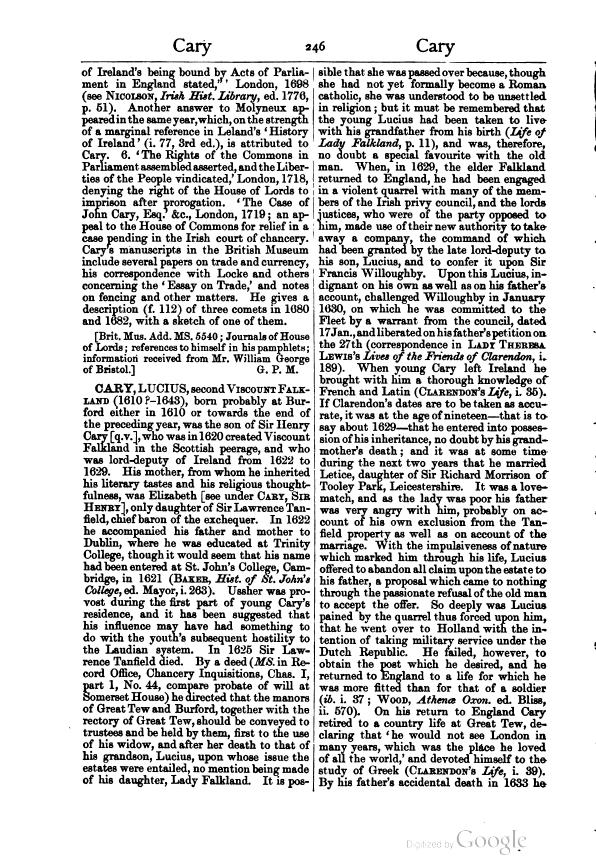of Ireland's being bound by Acts of Parliament in England stated,”’ London, 1698 (see Nicolson, Irish Hist. Library, ed. 1776, p. 51). Another answer to Molyneux appeared in the same year, which, on the strength of a marginal reference in Leland's ‘History of Ireland’ (i. 77, 3rd ed.), is attributed to Cary. 6. ‘The Rights of the Commons in Parliament assembled asserted, and the Liberties of the People vindicated,’ London, 1718, denying the right of the House of Lords to imprison after prorogation. ‘The Case of John Cary, Esq.’ &c., London, 1719; an appeal to the House of Commons for relief in a case pending in the Irish court of chancery. Cary's manuscripts in the British Museum include several papers on trade and currency, his correspondence with Locke and others concerning the ‘Essay on Trade,’ and notes on fencing and other matters. He gives a description (f. 112) of three comets in 1680 and 1682, with a sketch of one of them.
[Brit. Mus. Add. MS. 5540; Journals of House of Lords; references to himself in his pamphlets; information received from Mr. William George of Bristol.]
CARY, LUCIUS, second Viscount Falkland (1610?–1643), born probably at Burford either in 1610 or towards the end of the preceding year, was the son of Sir Henry Cary [q. v.], who was in 1620 created Viscount Falkland in the Scottish peerage, and who was lord-deputy of Ireland from 1622 to 1629. His mother, from whom he inherited his literary tastes and his religious thoughtfulness, was Elizabeth [see under Cary, Sir Henry], only daughter of Sir Lawrence Tanfield, chief baron of the exchequer. In 1622 he accompanied his father and mother to Dublin, where he was educated at Trinity College, though it would seem that his name had been entered at St. John's College, Cambridge, in 1621 (Baker, Hist. of St. John's College, ed. Mayor, i. 263). Ussher was provost during the first part of young Cary's residence, and it has been suggested that his influence may have had something to do with the youth's subsequent hostility to the Laudian system. In 1625 Sir Lawrence Tanfield died. By a deed (MS. in Record Office, Chancery Inquisitions, Chas. I, part 1, No. 44, compare probate of will at Somerset House) he directed that the manors of Great Tew and Burford, together with the rectory of Great Tew, should be conveyed to trustees and be held by them, first to the use of his widow, and after her death to that of his grandson, Lucius, upon whose issue the estates were entailed, no mention being made of his daughter, Lady Falkland. It is possible that she was passed over because, though she had not yet formally become a Roman catholic, she was understood to be unsettled in religion; but it must be remembered that the young Lucius had been taken to live with his grandfather from his birth (Life of Lady Falkland, p. 11), and was, therefore, no doubt a special favourite with the old man. When, in 1629, the elder Falkland returned to England, he had been engaged in a violent quarrel with many of the members of the Irish privy council, and the lords justices, who were of the party opposed to him, made use of their new authority to take away a company, the command of which had been granted by the late lord-deputy to his son, Lucius, and to confer it upon Sir Francis Willoughby. Upon this Lucius, indignant on his own as well as on his father's account, challenged Willoughby in January 1630, on which he was committed to the Fleet by a warrant from the council, dated 17 Jan., and liberated on his father's petition on the 27th (correspondence in Lady Theresa Lewis's Lives of the Friends of Clarendon, i. 189). When young Cary left Ireland he brought with him a thorough knowledge of French and Latin (Clarendon's Life, i. 35). If Clarendon's dates are to be taken as accurate, it was at the age of nineteen—that is to say about 1629—that he entered into possession of his inheritance, no doubt by his grandmother's death; and it was at some time during the next two years that he married Letice, daughter of Sir Richard Morrison of Tooley Park, Leicestershire. It was a love-match, and as the lady was poor his father was very angry with him, probably on account of his own exclusion from the Tanfield property as well as on account of the marriage. With the impulsiveness of nature which marked him through his life, Lucius offered to abandon all claim upon the estate to his father, a proposal which came to nothing through the passionate refusal of the old man to accept the offer. So deeply was Lucius pained by the quarrel thus forced upon him, that he went over to Holland with the intention of taking military service under the Dutch Republic. He failed, however, to obtain the post which he desired, and he returned to England to a life for which he was more fitted than for that of a soldier (ib. i. 37; Wood, Athenæ Oxon. ed. Bliss, ii. 570). On his return to England Cary retired to a country life at Great Tew, declaring that ‘he would not see London in many years, which was the place he loved of all the world,’ and devoted himself to the study of Greek (Clarendon's Life, i. 39). By his father's accidental death in 1633 he
